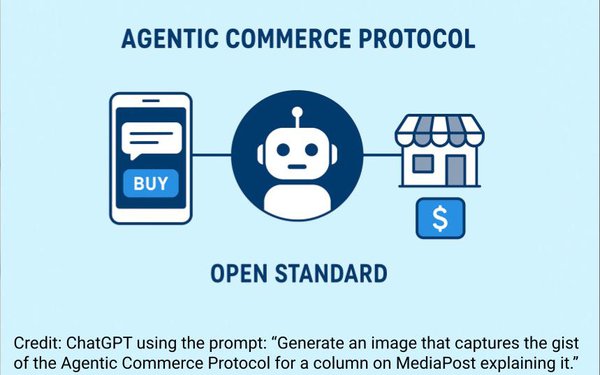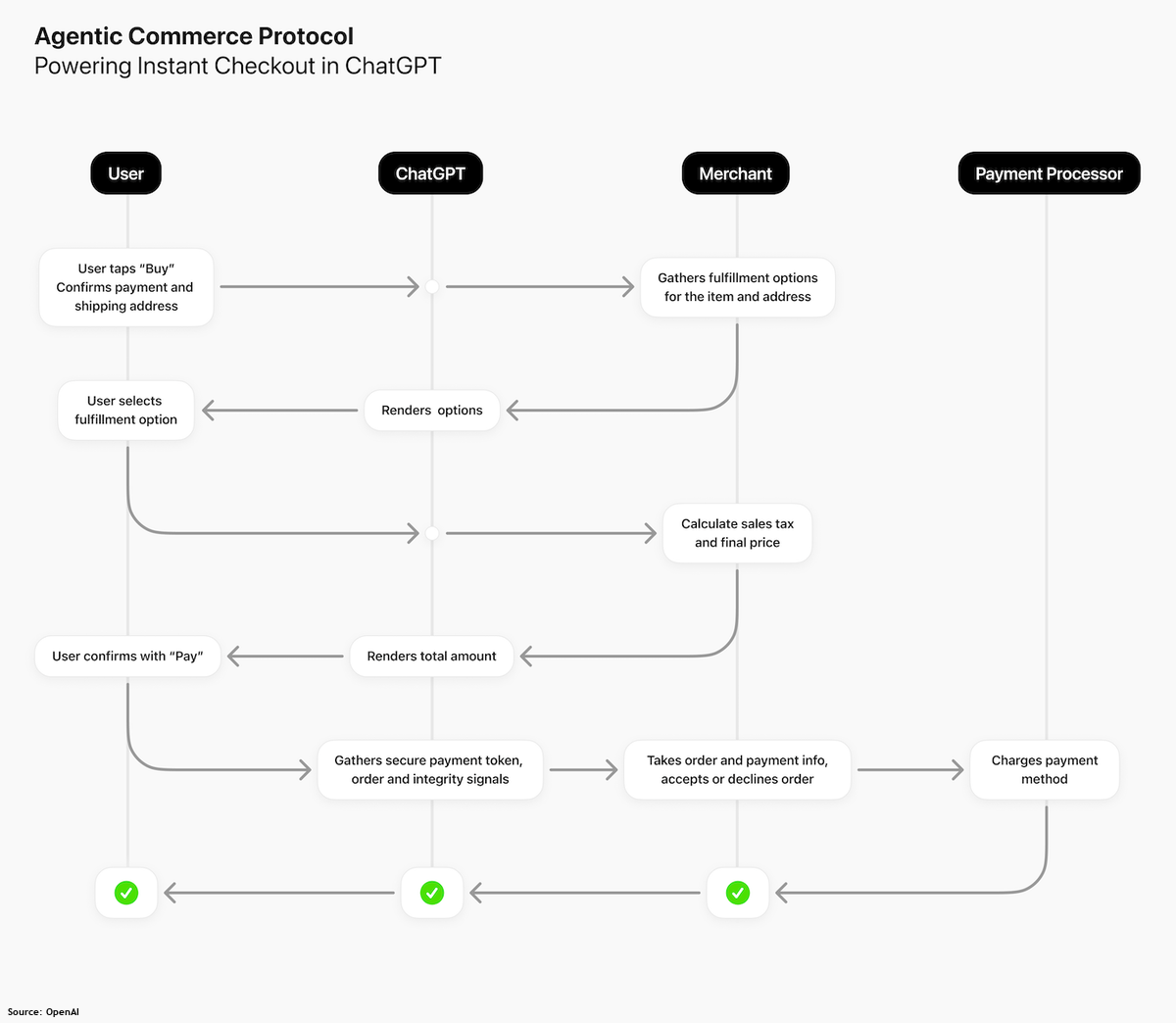
OpenAI just launched the biggest disruption to
commerce in years — AI is becoming the engine of commerce itself.
This week’s release of OpenAI’s Agentic Commerce Protocol (ACP), an open-source model for
agent facilitated commerce, marks a turning point in how consumers will shop online and how merchants will compete. With ACP, online shopping is no longer limited to browsing eCommerce sites and apps.
Instead, agents can now access detailed product information to fully research and purchase on the consumer’s behalf. The technology lays the groundwork for buying or booking of goods, services,
travel and more – all in a seamless “instant checkout” experience available natively in the AI platform. And unlike other recent agentic commerce releases from big tech, the
functionality works today.
advertisement
advertisement
This new era of AI commerce isn’t just changing the shopping journey, it’s reshaping what it means to be a merchant, redefining the role of
websites, and raising new questions about consumer privacy as well as merchant data protection.
Instant Checkout Today vs. Tomorrow
Today, instant
checkout through ACP is being piloted through ChatGPT with Shopify and Etsy. Shoppers can instruct their ChatGPT agent to find a product, pulling details directly from the merchant, and complete the
purchase without switching tabs or filling out forms. It’s convenient, fast, and reduces friction.
But this is just the beginning. Tomorrow, ACP will extend far beyond
eCommerce marketplaces. Imagine asking your AI to:
Research your next trip, then book a flight and hotel package that fits
your criteria.
Reserve a class at your local gym, at a time that fits your schedule.
Order groceries while also scheduling your dentist appointment.
This is where AI shopping for services, experiences,
and travel will flourish. The AI won’t just buy products—it will become the universal layer for every online transaction.
Websites as the New
Storefronts
If AI assistants are handling checkout, what happens to traditional websites? We believe they will evolve into the equivalent of physical storefronts: places for
brand storytelling, customer engagement, trust building, 1P data collection, AI context generation, and merchandising or inventory management.
Just like flagship stores exist
on high streets to create memorable experiences, websites will increasingly serve the same functions; especially for new-to-brand shoppers versus loyalists. They’ll showcase values, capture
attention, and gather customer data. However, we predict the actual transaction will increasingly flow through ACP like systems and AI agents that simplify the process, and require one less click in
the path to purchase.
Brand owned digital experiences will remain critical, but their role shifts from transaction hubs to brand, content and supply nodes that feed into the AI
commerce engine.
Why Retailers Should Be Nervous
While this shift is positive for manufactured brands and service providers, true retailers should
be worried. If AI becomes the retailer—owning discovery, price comparison, and checkout—traditional players risk becoming mere suppliers.
Even Amazon, the dominant
eCommerce aggregator, is vulnerable. For years, Amazon controlled the shopping journey and used merchant data to launch private-label products. But if consumers bypass Amazon search and go straight to
AI agents, Amazon loses its gatekeeper role. Unless Amazon adapts quickly, AI platforms could replicate its model—and even turn it against them.
The future of retail may no
longer belong to the biggest store. It may belong to the smartest AI.
The Merchant Data Dilemma
For merchants, ACP offers massive opportunity but
also serious risks. Joining ACP provides access to new customers and streamlined transactions, but it requires exposing sensitive data:
That data doesn’t
just enable transactions. It also trains AI models. Over time, these models could identify profitable patterns and undercut merchants by offering competitive solutions or AI-driven private label
products.
This is the same playbook Amazon has used against its sellers—only now, the risk is amplified by AI’s speed and scale. Merchants must weigh whether ACP is
fueling growth or seeding their own disruption.
Consumer Risks in AI Shopping
Consumers will benefit from frictionless shopping, but not without
trade-offs. ACP-enabled agents will handle sensitive intent data such as:
“Find me the cheapest hotel near Napa this
weekend.”
“Book a pediatrician appointment at 3 pm Friday.”
“Order my monthly supplements with fastest shipping.”
This data reveals not just what consumers buy, but when, why, and how
often. Without strong safeguards, it could be monetized or misused. Consumers should celebrate the convenience of AI commerce, but also demand transparency and data privacy controls.
The Battle for Control of AI Commerce
The rise of agentic commerce signals a new battle: who owns the storefront of the future?
Retailers want to protect their brand and customer relationships.
AI
platforms want to own discovery, checkout, and loyalty.
Consumers want convenience without losing control of their data.
If OpenAI’s ACP succeeds, the shopping journey will be AI-first, not website-first. Merchants and retailers must adapt quickly, or they’ll find themselves
supplying an AI-controlled marketplace where their brand becomes invisible.
Conclusion: The Age of AI Shopping
The future of AI commerce is
unfolding rapidly. OpenAI’s ACP is not just about buying on Etsy or Shopify—it’s about transforming how we shop for everything from products to travel to services.
For consumers, it promises convenience and personalization at the potential expense of privacy. For merchants, it brings scale but threatens sovereignty. And for traditional
retailers—even giants like Amazon—it poses an existential challenge.
The big question is not whether AI shopping will happen, but who will control it. One thing is clear:
the age of AI commerce has only just begun, and its impact will be as disruptive as the shift from physical stores to eCommerce two decades ago.
